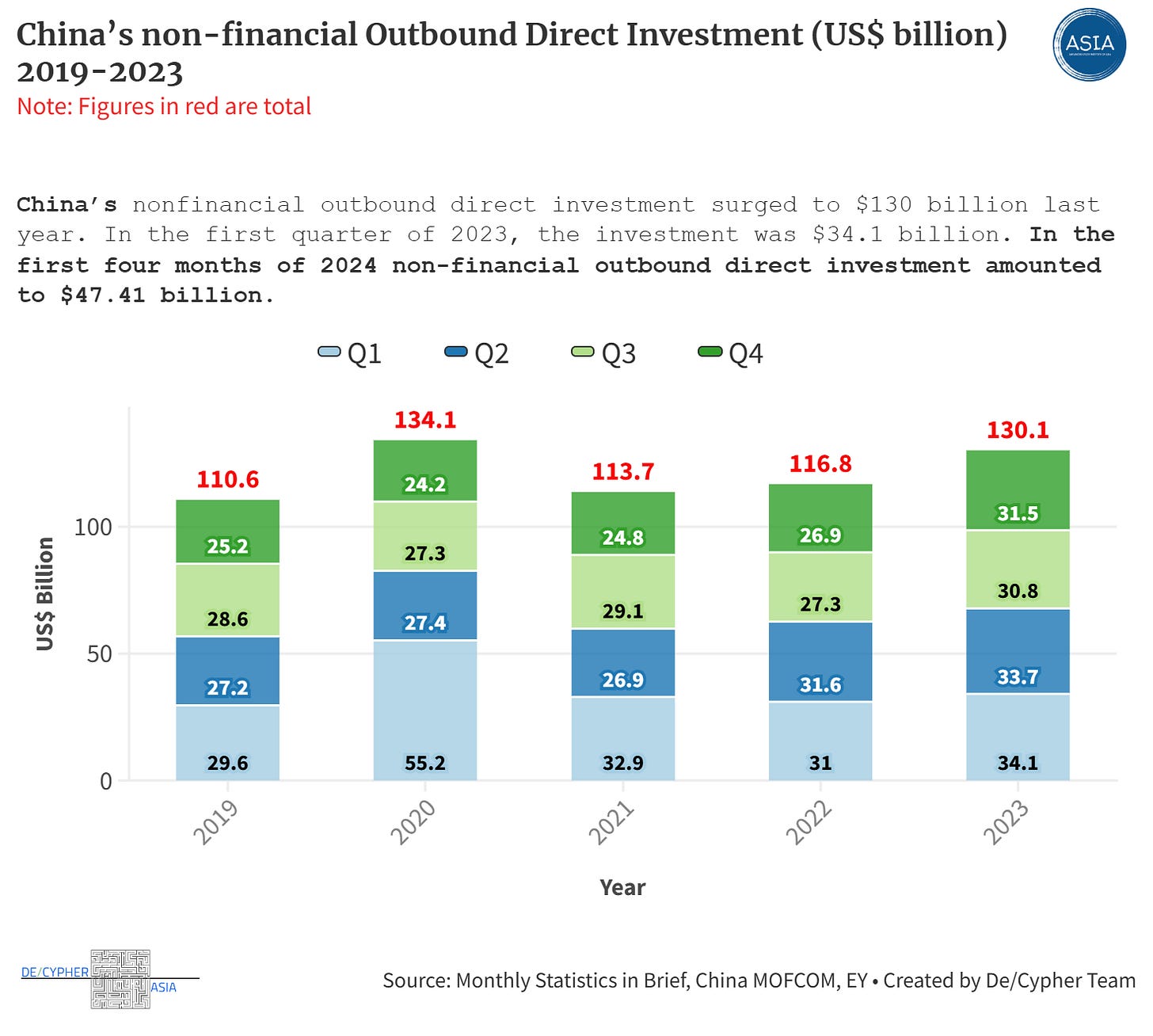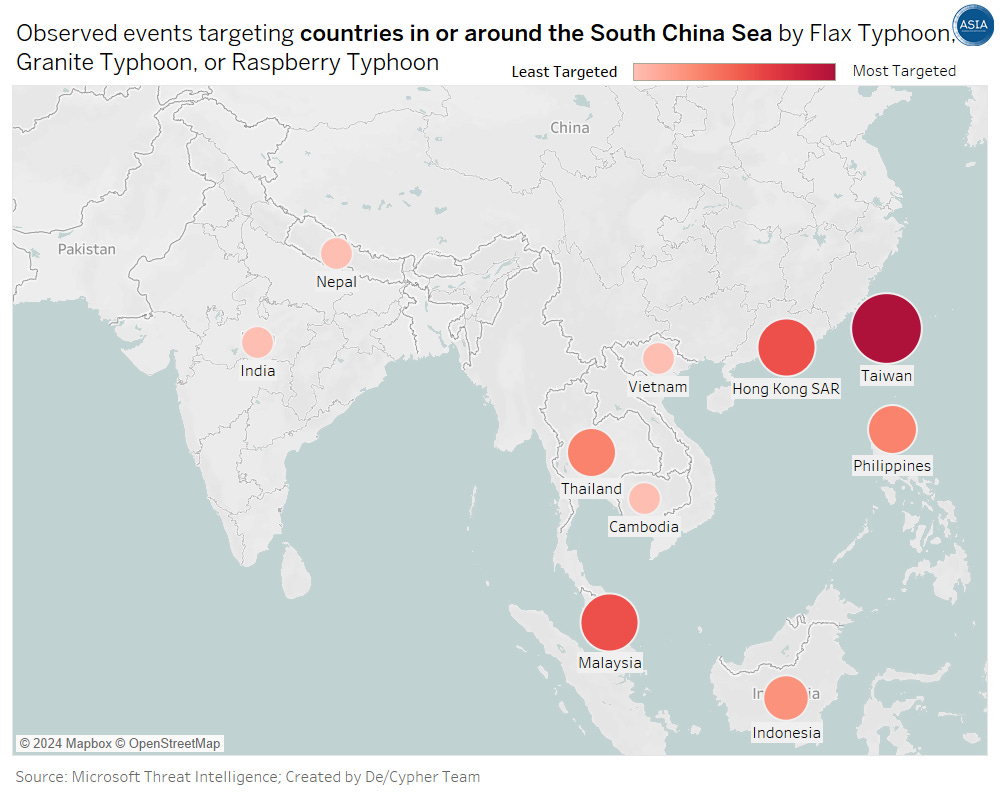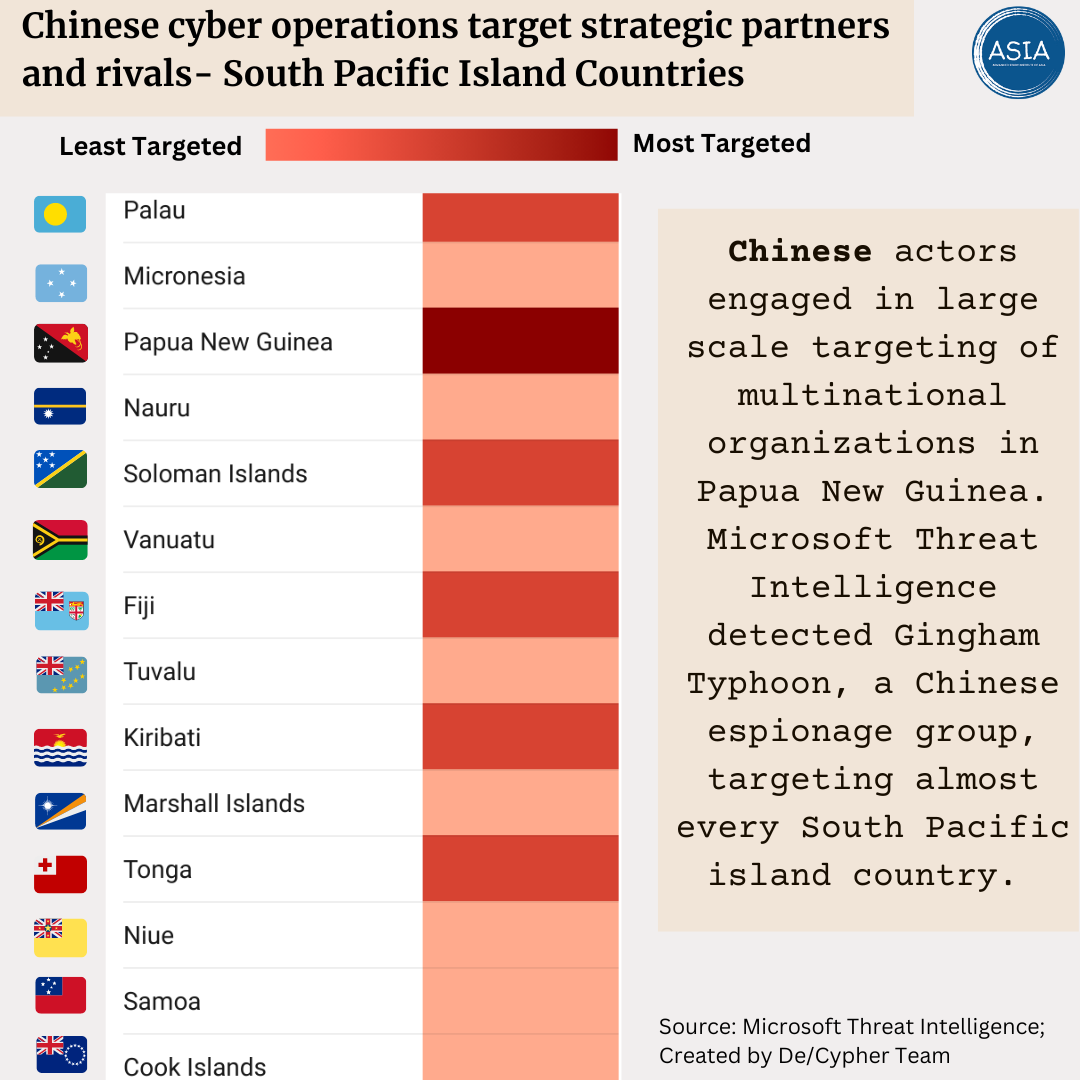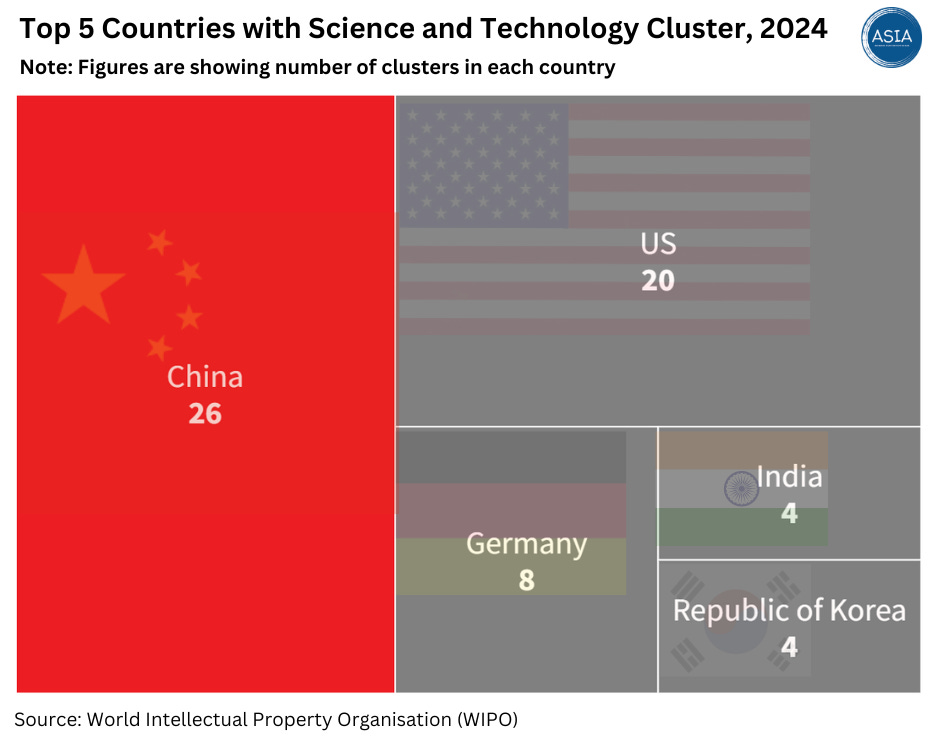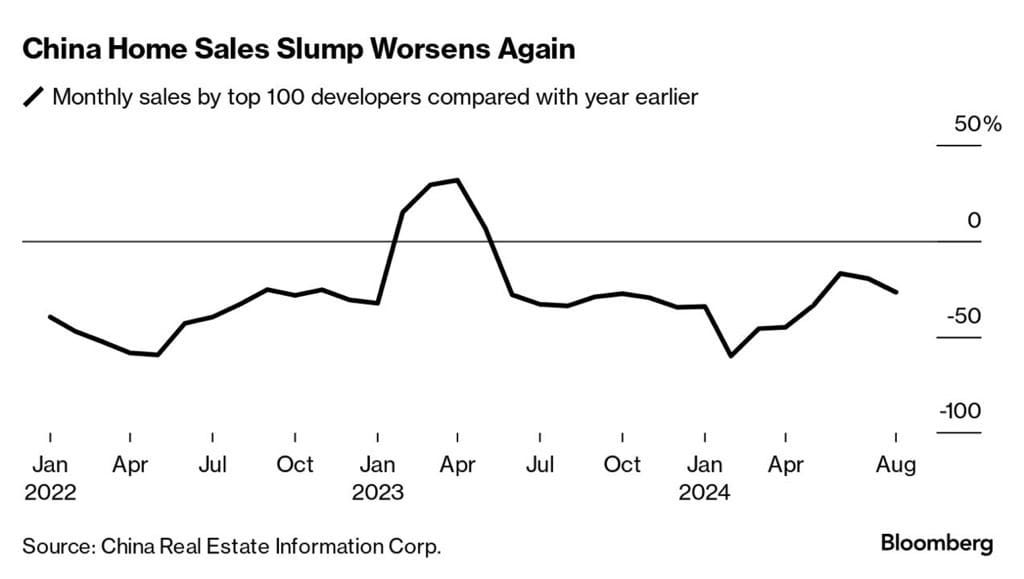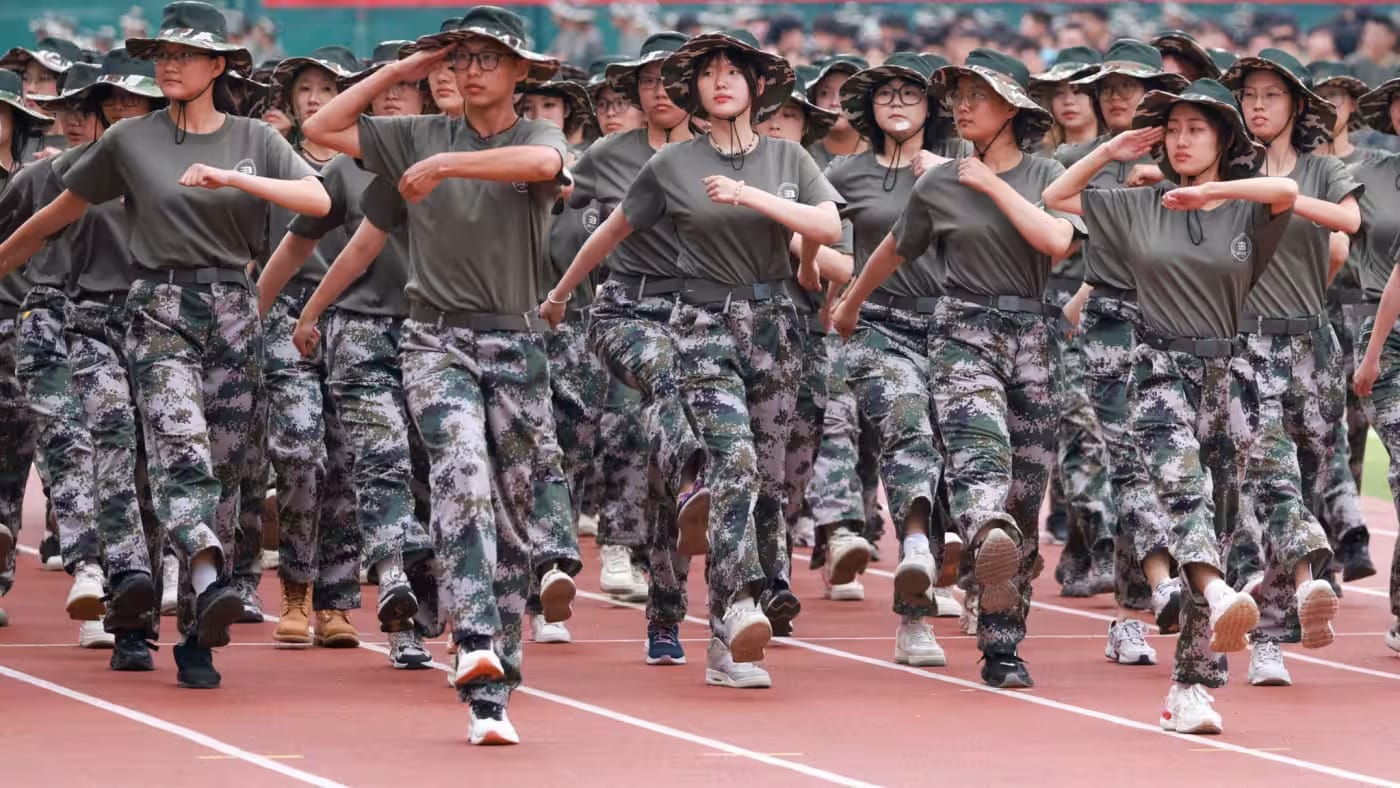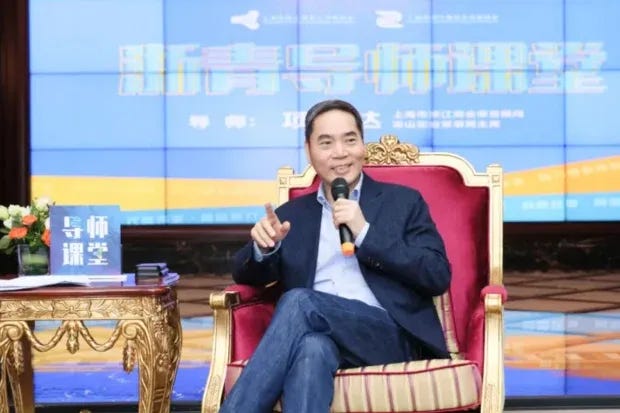Rising Cyber Threats, Chinese Influence in Myanmar, and Asia's Dominance in 2024 Innovation Index
This edition of De/Cypher examines East Asia's cyber threats, from espionage and economic disruption to AI-driven public opinion manipulation. It also highlights China's growing influence in the Myanmar conflict and the rise of Asian countries in the Glob
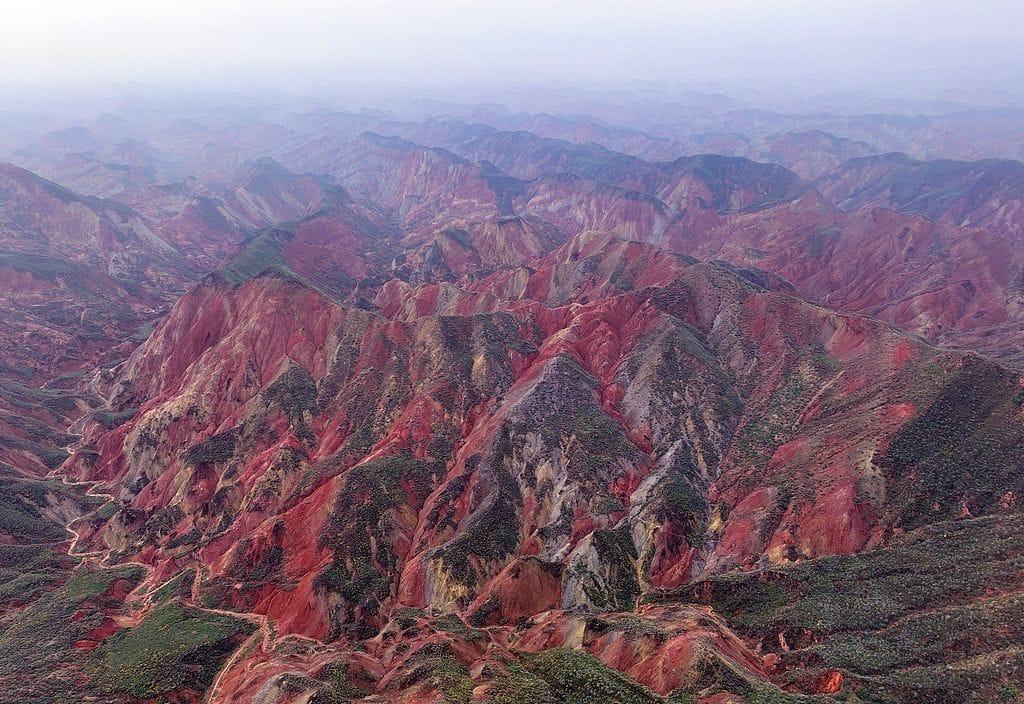
China Quote
“I worry about the impact of the lack of nutrition on my daughters’ growth. I would rather not eat myself to make sure they have enough,” -Hong Kong homemaker Fion Chan, Hong Kong is going through a crisis where food banks have become the primary source of cooked meals for poorer families.
De/Cypher Data Dive📈
Some Chinese industries have moved overseas. In the face of trade restrictions from the U.S. and Europe, coupled with fierce competition at home, Chinese companies are going global to explore new markets and improve their profitability. The other reason for the industrial relocation is China's rising labour and raw material costs. China’s nonfinancial outbound direct investment surged from $116.8 billion from 2022 to $130 billion in 2023. (Caixin)
Asia View🌏
Microsoft Threat Intelligence Report: Credible Cyber Threats Are Increasing.
Analysed By De/Cypher Team
East Asia has been subject to sophisticated cyber threats relating to espionage, distorting public opinion through AI content and economic disruption. These attacks have been carried out mainly by China and North Korea against nations, MNCs and strategic sectors. The Gingham Typhoon is a China-based espionage group that has carried out multiple attacks in the South Pacific region. Flax Typhoon and Granite Typhoon have targeted ASEAN nations to further Chinese geopolitical goals in the South China Sea region. Countries attacked include Indonesia, Malaysia and Taiwan.
Chinese Cyber Operations:
Gingham Typhoon targeted nearly every South Pacific Island country, including Papua New Guinea, focusing on government entities, IT sectors, and multinational organisations.
Raspberry Typhoon targeted Indonesian and Malaysian military entities before a multilateral naval exercise involving the US in June 2023.
Flax Typhoon compromised targets in the Philippines, Hong Kong, India, and the US in early fall and winter 2023.
Nylon Typhoon targeted government entities in Brazil, Guatemala, Costa Rica, Peru, Portugal, France, Spain, Italy, and the UK between June and December 2023.
Volt Typhoon continued targeting US critical infrastructure and compromised small office and home office (SOHO) devices across the US from June to December 2023.
Chinese Influence Operations:
Storm-1376 used AI-generated audio clips of Terry Gou on Taiwan's election day, falsely portraying him endorsing another candidate.
AI-generated news anchors were used in campaigns featuring Taiwanese officials and messaging on Myanmar.
AI-enhanced videos targeted Canadian members of parliament, falsely depicting a Canada-based Chinese dissident making inflammatory remarks.
Storm-1376 promoted AI-generated memes of Taiwan's DPP presidential candidate William Lai in December 2023.
Storm-1376 spread conspiracy theories about the Hawaii wildfires in August 2023, using AI-generated images.
A campaign criticising Japan's Fukushima wastewater release was launched on August 24, 2023, targeting South Korean audiences on platforms like Kakao Story, Tistory, and Velog.io.
North Korean Cyber Operations:
Stole between $600 million and $1 billion in cryptocurrency in 2023 alone.
Jade Sleet conducted a $35 million heist from an Estonia-based cryptocurrency firm in early June 2023 and over $125 million from a Singapore-based platform a month later.
Diamond Sleet compromised a Germany-based IT company in August 2023 and a Taiwan-based IT firm in November 2023.
Diamond Sleet and Onyx Sleet exploited the TeamCity CVE-2023-42793 vulnerability in October 2023.
Emerald Sleet targeted diplomats and Korean Peninsula experts in various sectors throughout the period.
North Korean actors utilised AI large-language models (LLMs) to enhance spear-phishing campaigns and conduct reconnaissance.
State-level coordination: The report suggests that many of these operations are state-sponsored or state-affiliated. For instance, Chinese influence operations are linked to the Chinese Communist Party (CCP), while North Korean cyber operations are described as generating revenue for the North Korean government and its weapons program.
Shared infrastructure and techniques: The report mentions instances where different threat actors use similar tactics or exploit the same vulnerabilities. For example, both Diamond Sleet and Onyx Sleet exploited the TeamCity CVE-2023-42793 vulnerability in October 2023. This could indicate some level of coordination or shared resources among different groups.
Aligned objectives: Many of the operations described seem to align with broader geopolitical objectives. For instance, Chinese operations targeting the South Pacific Islands and South China Sea region align with China's strategic interests in these areas.
Reactive campaigns: The report describes how some influence operations, particularly those by Storm-1376, quickly react to current events. This suggests a level of coordination in rapidly developing and deploying messaging campaigns.
Content sharing: The report sometimes notes that content is shared or recycled across different actors. For example, it mentions that "Storm-1376 recycled content used by other actors in the Chinese propaganda ecosystem, including Chinese state-media affiliated social media influencers."
Consistent targeting: Different actors consistently focus on specific sectors or regions over time, suggesting a coordinated division of labour or targets.
The report indicates a significant escalation in the sophistication and scope of East Asian cyber and influence operations, particularly in using AI-generated content and targeting critical infrastructure and political processes.
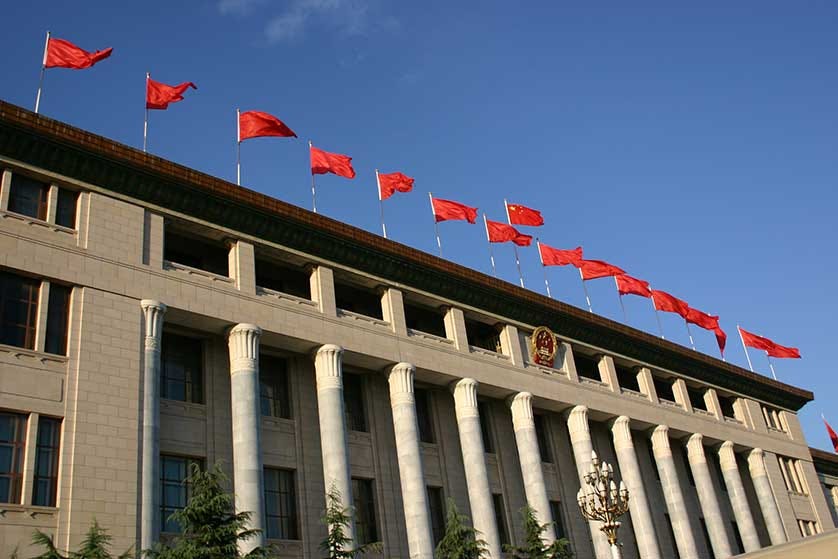
Quick China: Unmissable Stories 📜
Breaking: China approves plan to raise retirement ages
China will raise the retirement age for the first time since 1978, a move likely to slow a decline in the labour force and support the economy. The new retirement ages will be 63 for men, 58 for women. The new ages come into effect from 1st January,2025. (Xinhua)
China moves to play 'Okinawa card' over Japan's Taiwan stance
A Hong Kong newspaper recently reported that China's military-linked Dalian Maritime University plans to open "a Ryukyu research centre" devoted to Okinawa, Japan's southernmost prefecture. Social media posts also confirmed that top academics had met to prepare for establishing the centre.
What is Beijing's motive behind this move? This week's China Up Close analyses it as a step following a 2013 People's Daily article saying that "the time has come when the historically unresolved Ryukyu issue can be discussed again," despite decades of official recognition of Okinawa as part of Japan.
If China uses the research centre as a key weapon to warn Tokyo against interfering in the Taiwan issue, it could be "a first-ever dangerous step," said an expert. The latest China Up Close sheds light on Beijing's stealth strategy and its possible implications. (Katsuji Nakazawa, Nikkei)
China university plans to establish Ryukyu research centre in possible warning against Japan
On Sept. 1, the Dalian university held a seminar on "Ryukyu issues" to prepare for the opening of the centre, bringing together over 20 experts from top academic institutions, including Peking University in Beijing, Fudan University in Shanghai and the Chinese Academy of Social Sciences, the Hong Kong daily said last week.
If established, it would be the first research centre specialising in Okinawa at a higher education institution in China, according to the report, also it is a warning to Japan to stay out of Taiwan. (The Mainichi)
Fiscal Spending And Monetary Easing Key to Stabilising China’s Economy, Says Expert
Easing monetary policy while increasing fiscal spending could alleviate the economic pressures currently affecting China, said Huang Yiping, dean of the National School of Development at Peking University.
The monetary policy of the People’s Bank of China is central to addressing these macroeconomic challenges, particularly in the face of rising interest rate pressures and a slowing economy, he said speaking at a seminar at Peking University Monday. And the bank’s ultimate goal when adjusting monetary policy is to stabilise the economy in the short term. (Caixin)
US accuses China of directly supporting Russia’s ‘war machine’
Alexander Gabuev, director of the Carnegie Russia Eurasia Center in Berlin, said Moscow had become more willing to collaborate with Beijing on military technology after its annexation of Crimea in 2014 and the process had accelerated since its full-scale invasion of Ukraine in 2022.
“Russia realised that China is pumping tens of billions of dollars into defence research and production, annually,” Gabuev said.
“Russia realised that in certain limited areas, where Russia still has superiority, it has a window of opportunity right now to grow into the Chinese market, earn money, and in the best-case scenario, create a joint value chain.” (FT)
State media criticises anti-Japanese behavior of Internet celebrity
China’s nationalistic bent reared its ugly head again this week but the public, government and state media signalled they weren’t buying it, at least this time.
The episode involved a spat between a Chinese influencer and two Japanese tourists at Yuanmingyuan, also known as the Old Summer Palace, in Beijing.
Words were exchanged over sharing a spot for taking photos at the scenic area. The influencer who goes by Yaren then apparently followed the visitors around loudly proclaiming he’d never make way for Japanese people. (Shanghai Daily)
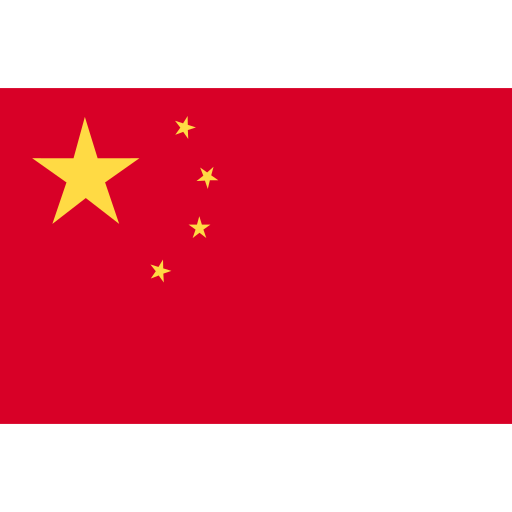
Beyond The Great Wall 🧱
Exploring News About China in Depth
The Chinese Influence in Myanmar’s Civil War
Written By Priyanka Garodia, Geopolitical Analyst
The Myanmar Junta or the Tatmadaw has subject Burmese people to a brutal rule since they ceased power in 2021, ousting the National League for Democracy (NLD). The aftermath of this coup was a bloody civil war that Myanmar still fights. The army is opposed by several ethnic armed organisations (EAOs) that are carrying out armed rebellion against the military rulers. The most prominent among these forces are the Three Brotherhood Alliance including the Ta'ang National Liberation Army (TNLA), Arakan Army (AA), and Myanmar National Democratic Alliance Army (MNDAA). Their strongholds are the Northern Shan State and Rakhine State. The National Unity Government (NUG) that operates in regions like Chin State and Kayah State. The Kachin Independence Army (KIA) operational in the Kachin state. The Karen National Union (KNU) that is actively fighting the Myanmar Military in the Karen state region. They have collaborated with the NUG and other groups to ensure continued resistance.
These armed groups have made considerable gains in the northern regions of Myanmar wrenching it out of military control. Instrumental in these wins has been China’s strategic involvement with the rebel forces especially the Three Brotherhood Alliance. The Northern borders of Myanmar play an important geostrategic role in China’s ambitions of construction the Belt and Road Initiative (BRI). Officially promoting peace, China has become an influential actor in the ongoing conflict in Myanmar by acting as a facilitator and provider of essential services especially in the Kokang district. The military leadership of the Junta is in a moment of crisis that the Chinese are taking full advantage off. The loss of major territory in the north, the strengthening of the rebel forces and an increasing problem of defection has led to a power vacuum in the region which China most energetically wishes to fill. The security and economic conditions of Myanmar remain dire and a source of regional instability.
2024 Global Innovation Index: Asia's Rising Dominance in Science & Technology Clusters
Written By Shivani Singh, Program Coordinator for Law & Critical Emerging Technologies
The 2024 edition of the Global Innovation Index (GII) Science & Technology (S&T) report has just been released, providing a comprehensive overview of the world’s leading S&T clusters and highlighting key developments in global innovation. While clusters in North America and Europe continue to play an important role, this year's rankings further underscore the rise of Asian countries, particularly China, Japan, and South Korea, as dominant forces in the global innovation landscape. Asia now boasts 26 clusters in the top 100, solidifying its status as a key player in global innovation.
Japan’s Tokyo–Yokohama cluster leads the rankings, contributing nearly 7% of global PCT applications, while China’s Shenzhen–Hong Kong–Guangzhou ranks second, driven by tech giant Huawei and top research institutions. Together, these two clusters account for 20% of global PCT filings, underscoring Asia's technological dominance. China’s innovation prowess is evident with Beijing (3rd) and Shanghai–Suzhou (5th) maintaining strong growth. New entrants like Nanchang and Kunming debuted in the top 100, while Hefei and Zhengzhou emerged as the fastest-growing clusters.
Daejeon in South Korea emerged as Asia's leading cluster in terms of intensity, securing the 7th spot, thanks to major players like LG Chem and LG Energy Solutions. Close behind were Beijing, China, which moved up to 11th place from 14th last year, and Tokyo–Yokohama, rising to 15th from 17th in the previous rankings.
India also makes strides, with Bengaluru (56th), Delhi (63rd), Chennai (82nd), and Mumbai (84th) entering the top 100. Malaysia's Kuala Lumpur debuted at 93rd, and Egypt's Cairo, the first North African cluster in the top 100, showcasing rapid growth.
Economy
China’s $6.5 Trillion Stock Rout Worsens Economic Peril for Xi.
Abhishek Vishnoi and Winnie Hsu write in Bloomberg that the ongoing collapse in Chinese stock markets has escalated into a major economic crisis, jeopardising the nation's financial stability and challenging policymakers to stem the decline. Amidst a backdrop of reduced consumer spending and heightened geopolitical tensions, efforts by state-backed funds to stabilise the market have proven largely ineffective, with the CSI 300 Index nearing its lowest point since early 2019 and underperforming on a global scale.
China's Foreign Trade Up 6% in First 8 Months.
CGTN reports that China's total goods imports and exports expanded by 6% year-on-year in the first eight months of 2024, with exports increasing by 6.9% and imports by 4.7%. ASEAN remains China's top trading partner, with trade totalling 4.5 trillion yuan, marking a 10% increase. Trade with Belt and Road countries also grew by 7%, indicating robust international trade dynamics despite global challenges.
China Deflation Risk Grows as Signs of Economic Weakness Mount.
Bloomberg News reports that China’s core inflation cooled to its weakest in over three years, underscoring the need for stronger economic stimulus. With factory-gate prices in deflation and weak demand threatening China’s growth target, experts urge more proactive fiscal policies and monetary easing to prevent a deeper economic downturn. The modest rise in consumer prices, driven by higher food costs due to poor weather, masks broader deflationary pressures that risk entrenching negative economic expectations.
China’s Unworkable Housing Rescue Math Is Prolonging Crisis.
Bloomberg News reports that China's plan to have local governments buy unsold homes to ease property oversupply has made little progress, with only 29 of over 200 cities participating. The slow uptake and the economic strain on local governments highlight the challenges in resolving the property slump. Despite the central government's push, the real estate sector continues to struggle, burdening China’s growth targets and local government finances.
China Asks Its Carmakers to Keep Key EV Technology at Home.
Linda Lew writes in Bloomberg that China is instructing its carmakers to retain advanced electric vehicle (EV) technology within the country while promoting the export of knock-down kits for assembly in overseas factories. This strategy aims to protect China’s technological advancements while navigating global tariffs. However, this approach may limit the global expansion efforts of Chinese car manufacturers, affecting their competitiveness abroad and possibly straining trade relations with countries like India and Türkiye.
China Renaissance Plunges on Trade Resumption as Star Dealmaker's Absence Clouds Prospects.
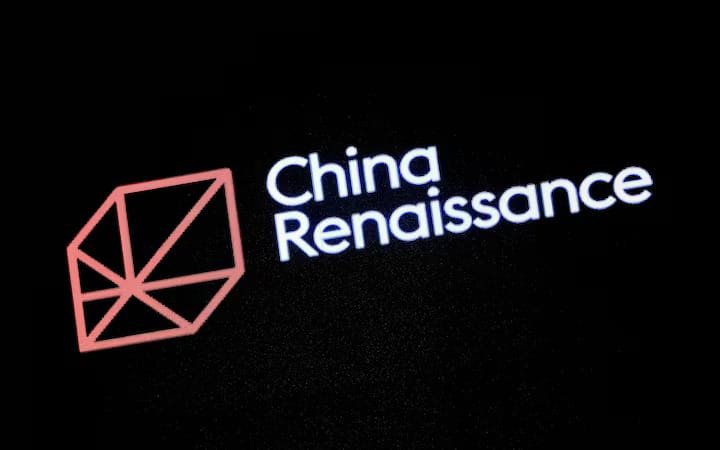
Selena Li and Donny Kwok report in Reuters that China Renaissance shares fell sharply upon trading resumption after a 17-month suspension. The absence of Bao Fan, the company's founder and major shareholder, following his undisclosed detention, has heavily impacted investor confidence. This has exacerbated the bank's challenges in a slowing Chinese economy, influencing a significant drop in stock value and casting doubts on the firm’s future direction and stability.
China Opens Printing, Chinese Medicine Industries to Foreign Investment.
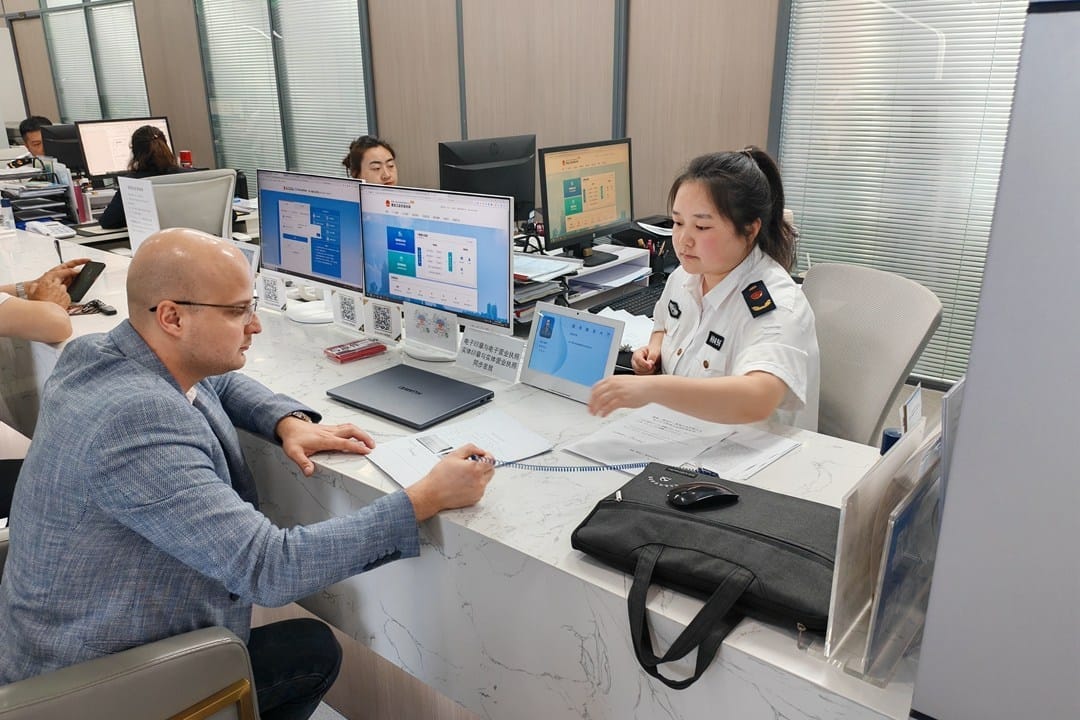
Zhang Yukun and Fan Qianchan report in Caixin Global that China has updated its negative list for foreign investment, removing restrictions on the printing and traditional Chinese medicine sectors. This change, effective from November 1, aligns with President Xi Jinping’s commitment to open all manufacturing sectors to foreign investment. Amid dwindling foreign direct investment, this policy revision aims to stimulate the sluggish economy and attract more international cooperation in these fields, reflecting China’s broader strategy to globalise its industries and revive economic growth.
Internal Politics 🏛️
Beijing Kicks Off Annual Defence Forum Amid Multiple Regional Disputes.
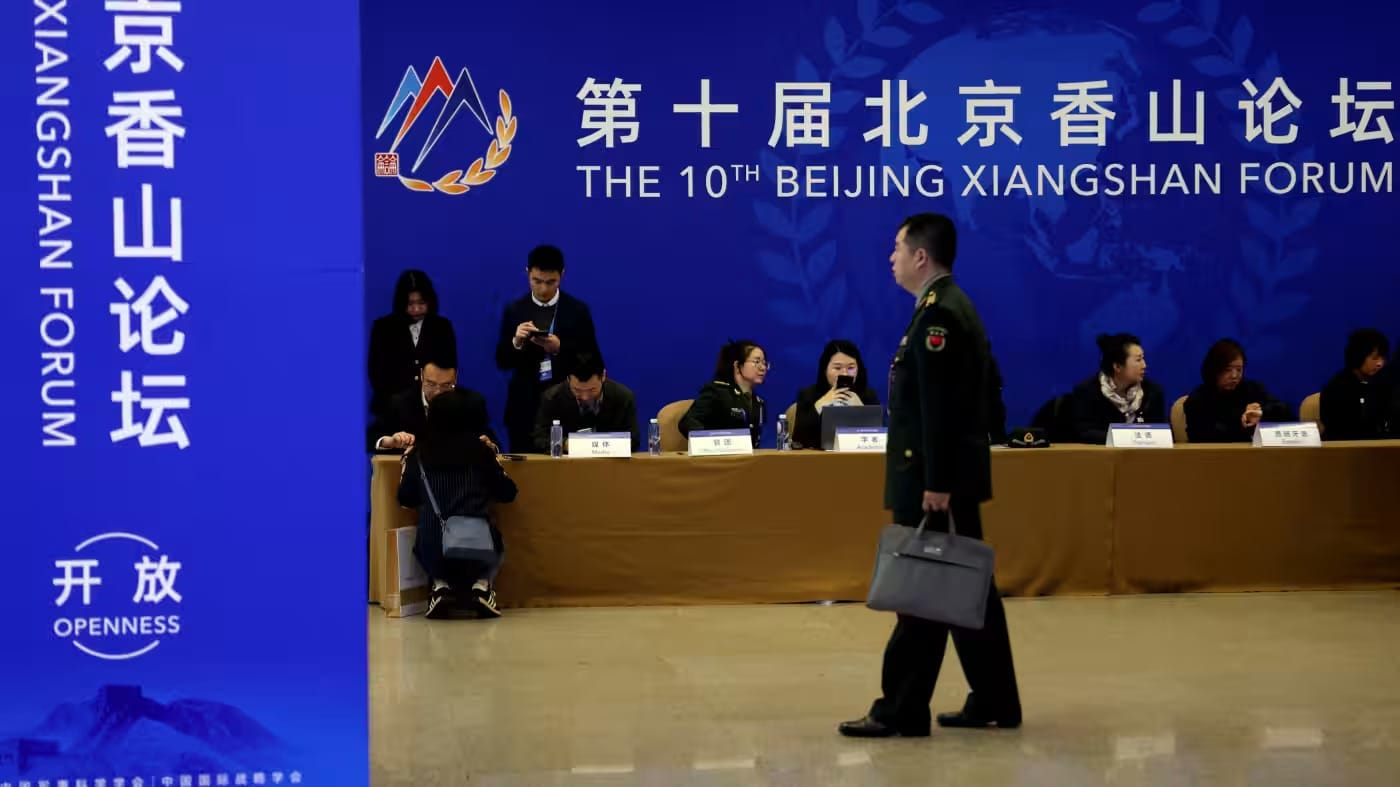
Laurie Chen reports in Reuters that China is launching its largest annual military diplomacy event, the Xiangshan Forum, amid ongoing regional tensions in the South China Sea and around Taiwan. The forum aims to position China as a responsible security player internationally, despite its involvement in territorial disputes. Over 90 countries and organisations will attend, reflecting China's strategic diplomatic efforts to strengthen ties with the Global South and assert its role in global security matters.
China to Strengthen Military Education at Universities.
Yukio Tajima writes in Nikkei Asia that China is advancing legislation to bolster military education in high schools and universities, reflecting President Xi Jinping’s increased focus on national security. The proposed amendments to the National Defence Education Law mandate drills and potentially criminalise non-compliance, as China aims to intensify defence preparedness amid growing geopolitical tensions with the U.S. over Taiwan and the South China Sea. This move is part of a broader strategy to fortify national unity and ensure loyalty to the Communist Party's governance.
Xi Makes Inspections in NW China's Shaanxi, Gansu Provinces.
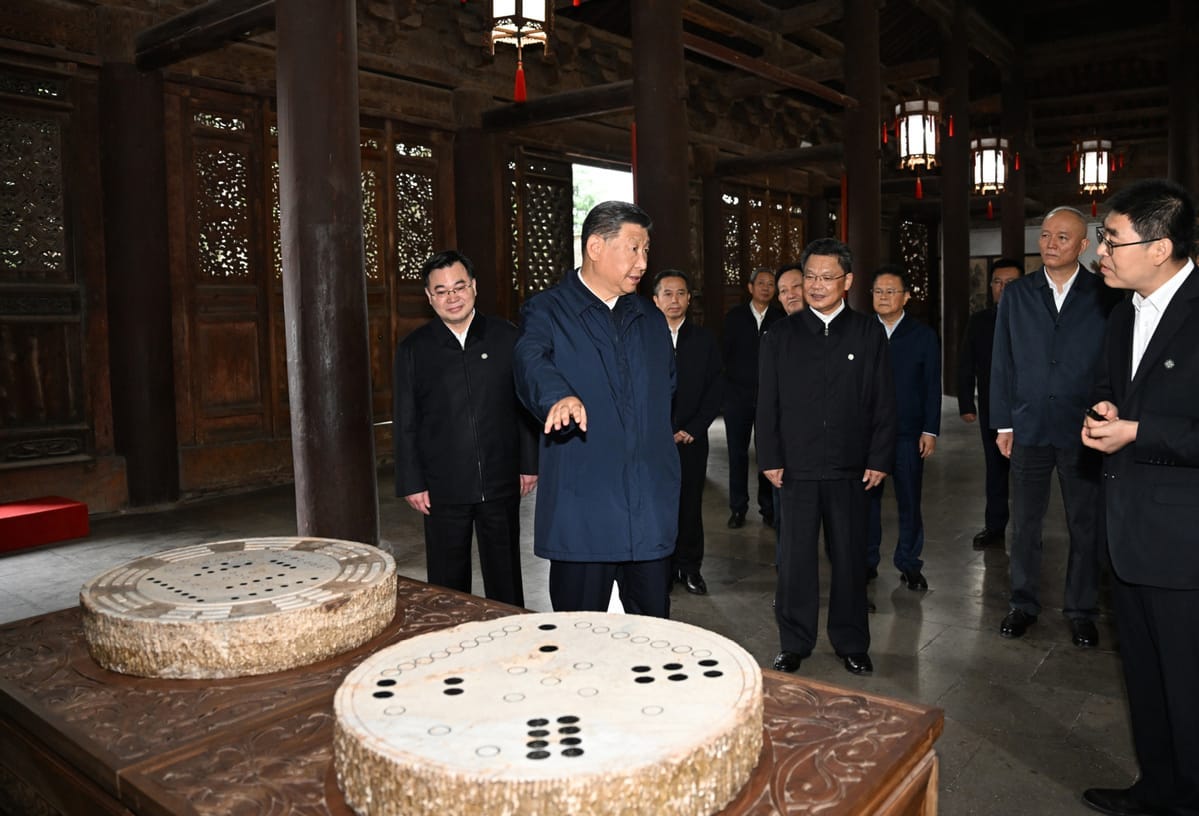
Xinhua reports that President Xi Jinping visited Shaanxi and Gansu provinces to inspect cultural preservation and agricultural development. His visits included the Baoji Bronze Ware Museum, the ecological park along the Weihe River, Fuxi Temple, and the Maijishan Grottoes. These inspections highlight Xi’s emphasis on cultural heritage protection and the advancement of the specialty fruit industry in mountainous regions, reflecting ongoing efforts to balance economic development with environmental and cultural conservation.
China Slaps Lifetime Football Bans on 43 Over Gambling, Match-Fixing.
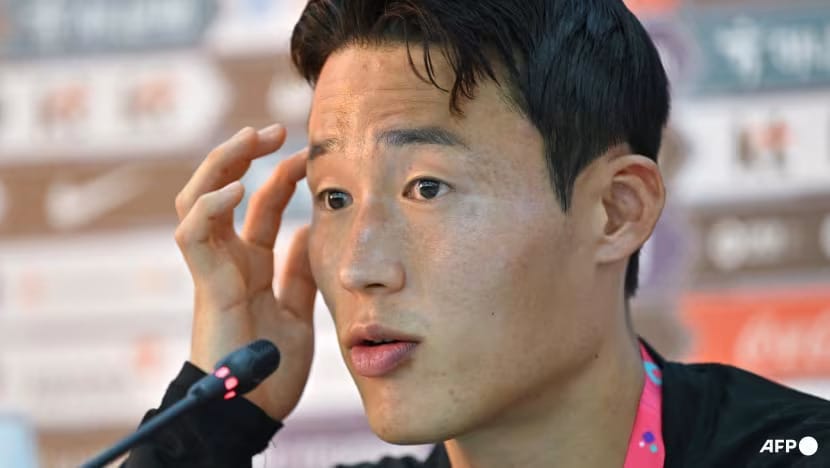
Channel News Asia reports that China has issued lifetime bans to 43 individuals, including three former national players and South Korean World Cup player Son Jun-ho, as part of a widespread crackdown on corruption in sports. This action is part of a broader effort under President Xi Jinping to combat corruption and improve the integrity of Chinese football, amidst ongoing challenges with corruption scandals and underperformance in international competitions.
China And The World🌐
Putin Casts Naval Exercise with China as Bid to Counter US in the Pacific.
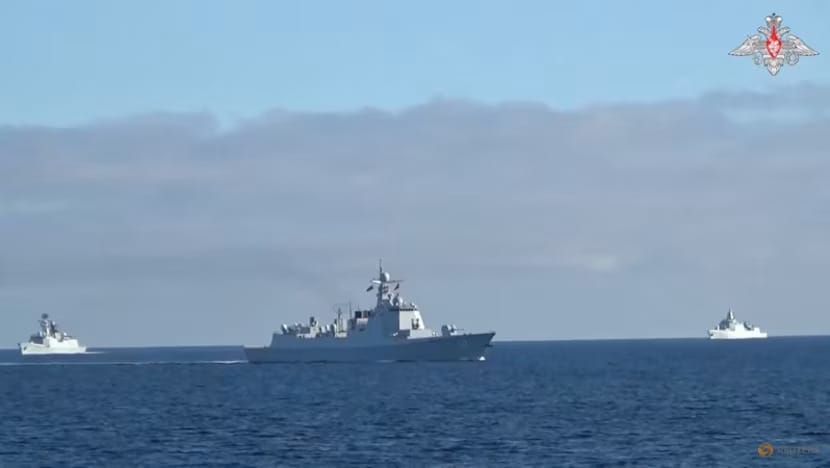
Channel News Asia reports that Russian President Vladimir Putin has framed joint naval exercises with China in the Sea of Japan as a response to perceived military pressures from the US in the Pacific. The "Ocean-2024" strategic exercises, spanning from the Mediterranean to the Pacific, aim to showcase combat-readiness and the use of advanced weaponry. This move reflects heightened geopolitical tensions and efforts by Russia and China to bolster their military cooperation against US influence in the region.
Philippines stands firm on Sabina Shoal but looks to ease tension with China
Reuters reports that the Philippines is committed to its position on Sabina Shoal despite ongoing tensions with China in the South China Sea. During recent discussions in Beijing, both nations expressed their stance and explored ways to deescalate the situation. The talks included potential cooperation on hotlines, coastguard collaboration, and marine science. China has reiterated its sovereignty claims, demanding the withdrawal of a Philippine coast guard ship stationed at the shoal since April.
China Says It’s Working with Vietnam on Flood Control After Typhoon Yagi.
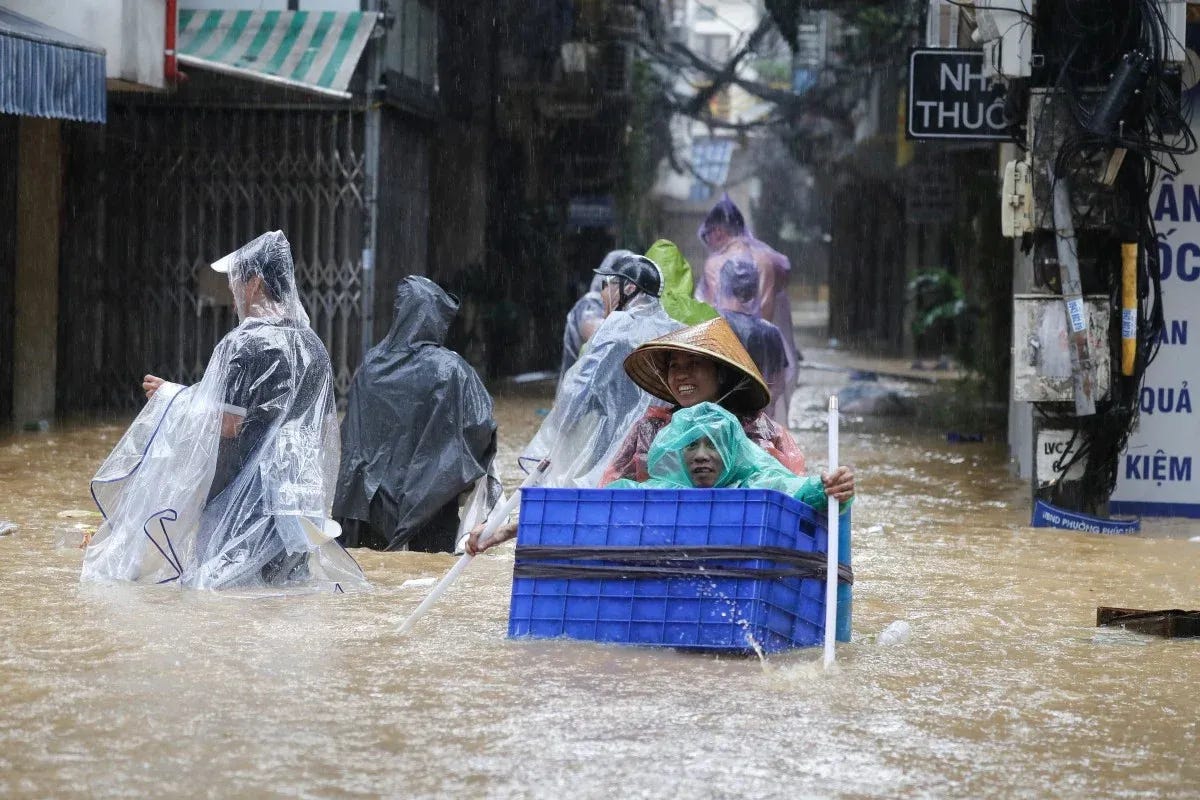
South China Morning Post reports that China is collaborating with Vietnam to manage flood control in the wake of Typhoon Yagi. The Chinese Foreign Ministry highlighted efforts to store water in hydropower station reservoirs along the Red River to aid Vietnam in mitigating the devastating floods that have resulted in significant casualties and extensive property damage. This cooperation is part of broader regional efforts to handle natural disasters more effectively.
Spanish Prime Minister Discusses Ukraine and Trade During Meeting with Xi in China.
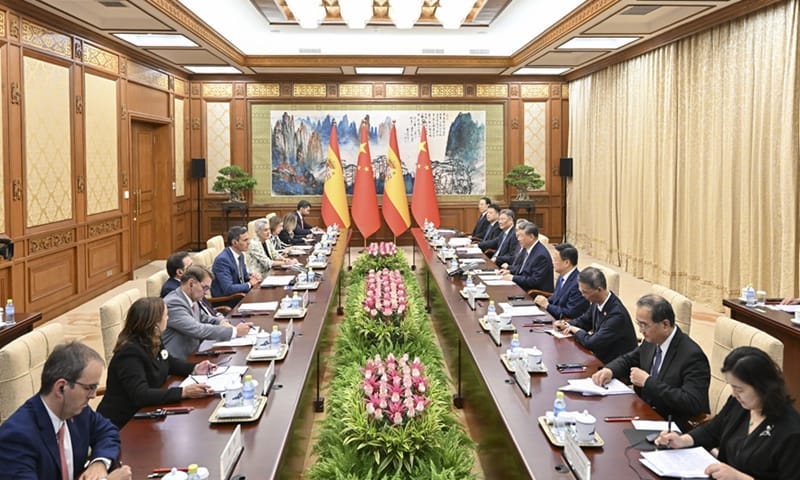
ABC News reports that Spanish Prime Minister Pedro Sánchez met with Chinese President Xi Jinping to discuss trade, the Ukraine conflict, and other bilateral issues. During his visit, Sánchez emphasised the importance of close relations with China, advocating for peace through the United Nations and promoting free trade and cultural exchanges. The discussions occur amid ongoing tensions regarding trade practices, notably concerning tariffs on Chinese electric vehicles and EU pork exports to China.
Saudi Arabia a Priority in China's Overall Diplomacy, Li Qiang Says.
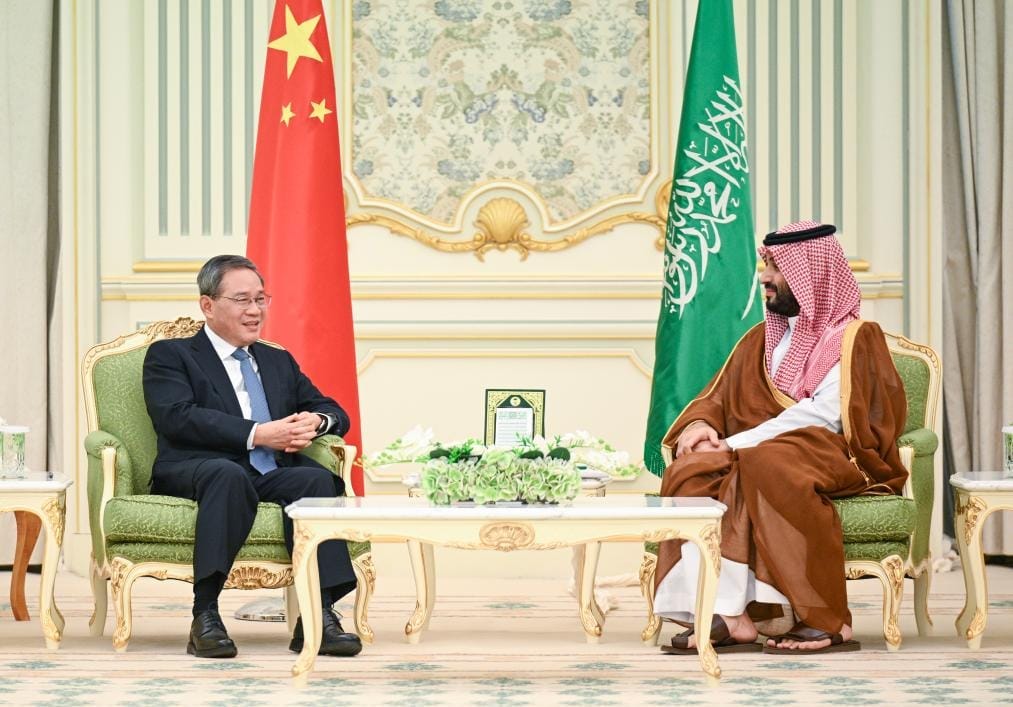
CGTN reports that Chinese Premier Li Qiang emphasised the significance of Saudi Arabia in China's diplomatic priorities during his meeting with Saudi Crown Prince Mohammed bin Salman. The discussions, aimed at enhancing bilateral relations, covered trade, cultural exchanges, and regional cooperation. Both leaders expressed a commitment to deepen ties across various sectors, highlighting the strategic alignment of their countries in global affairs. This partnership underscores mutual interests in energy, infrastructure, and fostering greater cultural understanding between the two nations.
Wang Yi Attends BRICS Meeting of High-Ranking Security Officials, Advisors.
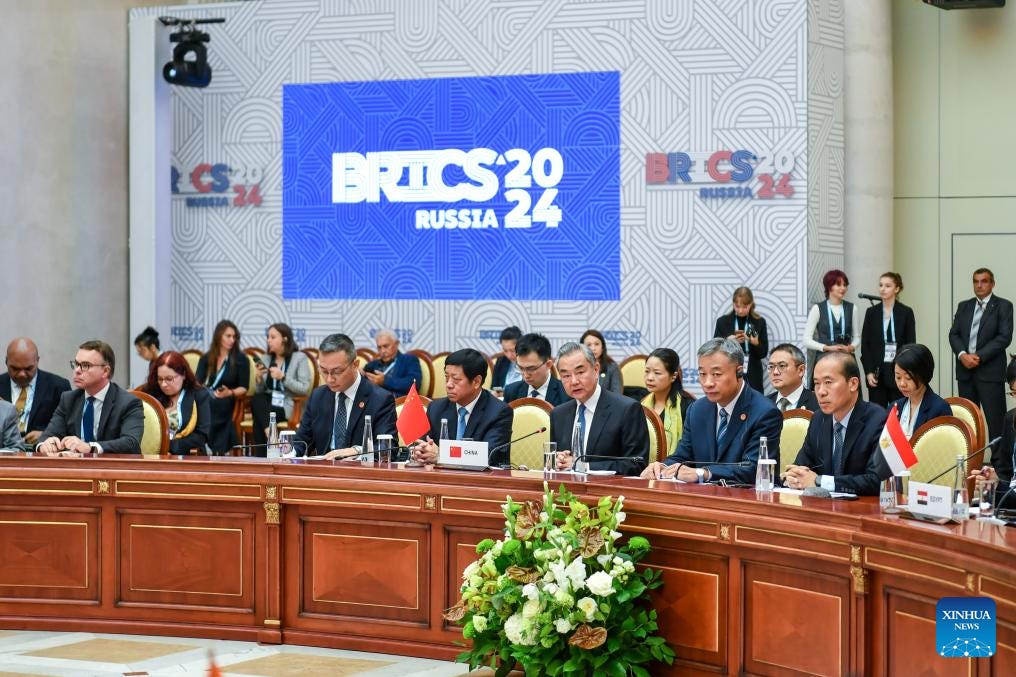
Xinhua reports that Wang Yi, China's foreign affairs chief, participated in the 14th BRICS meeting in St. Petersburg, focusing on security and international cooperation. Wang highlighted the importance of BRICS in global governance, emphasising its role in advocating for the interests of developing countries amidst global uncertainties. He emphasised the need for strategic coordination among BRICS nations to address global security challenges and uphold multilateralism, marking the meeting as a crucial step towards the upcoming BRICS summit in Kazan.
Chinese Premier Lands in Abu Dhabi for Visit.
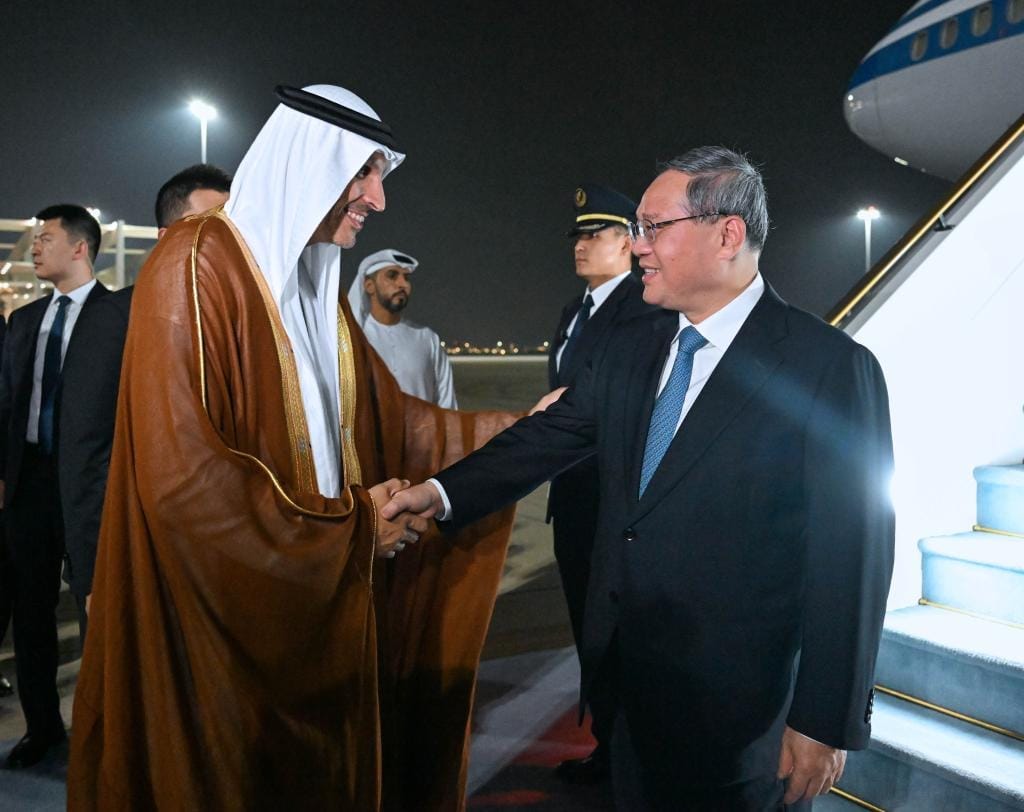
Xinhua reports that Chinese Premier Li Qiang has arrived in Abu Dhabi for an official visit, emphasising the strong growth and deepening friendship between China and the UAE. During this trip, which also marks the 40th anniversary of diplomatic relations between the two nations, Li aims to enhance the comprehensive strategic partnership through extensive dialogues and cooperation in various sectors. This visit follows his engagements in Saudi Arabia, highlighting China’s proactive diplomatic efforts in the Middle East.
Southeast Asia Is Bypassing ASEAN to Counter China.
Richard Javad Heydarian writes in World Politics Review that Southeast Asian nations are increasingly circumventing ASEAN to address tensions with China directly, particularly concerning the South China Sea disputes. At a recent ASEAN meeting, despite the presence of global powers and bilateral dialogues, there was little progress on concrete measures to manage or resolve the regional conflicts. The lack of substantive action and collective pressure on China highlights a shift toward bilateral and smaller multilateral formats among Southeast Asian countries to ensure their maritime security and sovereignty.
Trump Vows Tariffs, Harris Blames Xi for Hiding COVID in Tense Debate.
Ken Moriyasu writes in Nikkei Asia that during their first debate, former U.S. President Donald Trump promised to impose heavy tariffs, while Vice President Kamala Harris accused Chinese President Xi Jinping of obscuring details about COVID-19's origins. The debate highlighted deep divisions on foreign policy and economic strategies, with both candidates articulating starkly different visions for America's role in global affairs and its approach to China.
Ex-CIA officer who spied for China gets 10 years in prison — and a lifetime of polygraph tests.

AP News reports that Alexander Yuk Ching Ma, a former CIA officer who spied for China, has been sentenced to 10 years in prison and is required to submit to lifetime polygraph tests. Ma admitted to passing sensitive national defence information to China in exchange for money and gifts. He expressed remorse, hoping for forgiveness from God and America. The sentence was part of a plea deal to avoid a potential life sentence.
Korea Nabs Ex-Samsung Execs in $3.2bn China Chip Tech Scandal
Jim Pollard writes in Asia Financial that two former Samsung executives have been arrested in South Korea for allegedly stealing chip technology and using it to produce memory chips in a Chinese plant. The $3.2bn case has heightened concerns over technology theft, sparking calls for tougher penalties to protect South Korea’s critical industries amid escalating global chip rivalries.
European business confidence in China at all-time low, report says.
Euronews highlights that European companies are increasingly wary of investing in China, citing a politicised business environment and economic slowdown. The European Chamber of Commerce in China's report suggests urgent reforms to improve the investment climate, including more open markets and equitable treatment for foreign businesses. Tensions escalate as China investigates European products, responding to EU tariffs on Chinese electric vehicles.
India targets $500 billion electronics sector by 2030, Modi says.
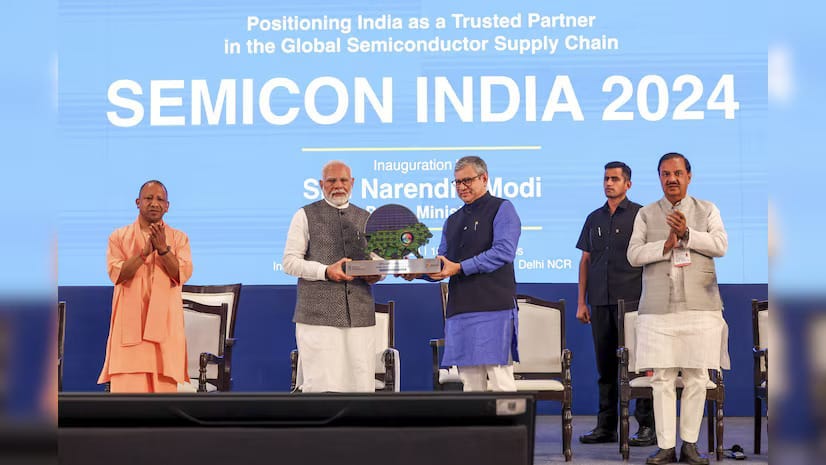
Bloomberg reports that Prime Minister Narendra Modi of India, opening Semicon 2024 in Noida, has positioned India prominently in the global semiconductor race. Amidst growing geopolitical tensions between Beijing and Washington, and a global trend towards reducing reliance on semiconductor producers like China and Taiwan, semiconductors have become a pivotal resource. Countries including the US, Germany, Japan, and Singapore are intensively boosting their domestic chipmaking capacities to secure supplies essential for technologies ranging from AI to electric vehicles. Modi highlighted India's burgeoning electronics market, now valued at US$155 billion, underlining the country's commitment to enhancing its semiconductor production capabilities.
China Nickel Tycoon Seeks Growth in US Energy-Storage Market.
Bloomberg reports that Chinese billionaire Xiang Guangda's battery company, REPT BATTERO Energy Co., has expanded into the US by opening an office in California. The company sees significant potential in the US energy-storage market, which it aims to have contribute over 10% of its revenue. Despite geopolitical tensions and potential tariff increases, REPT is strategically partnering with American companies to navigate regulatory challenges and compete with major players like Tesla Inc.
China to train thousands of overseas law enforcement officers to create ‘more fair’ world order
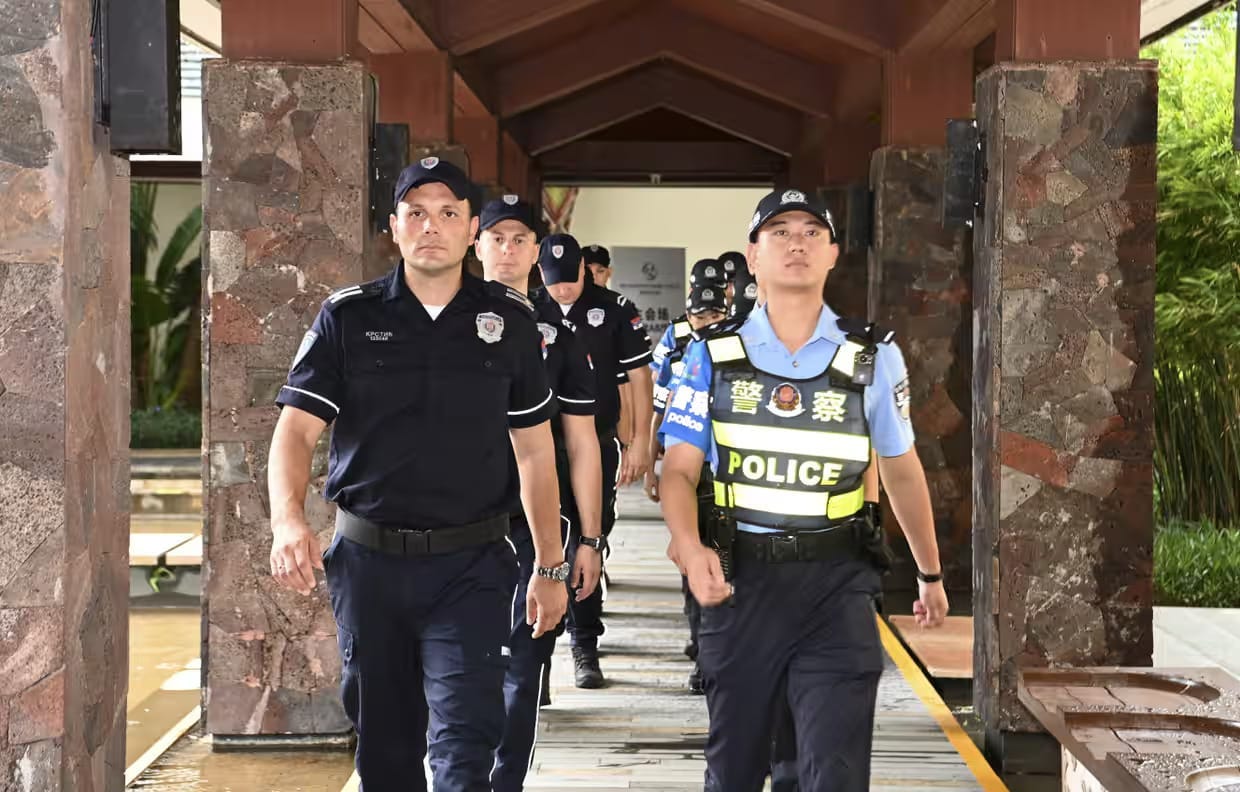
Helen Davidson writes in The Guardian that China will train thousands of foreign law enforcement officers to shape a "more fair" world order, according to Wang Xiaohong, China’s minister for public security. This initiative is part of China’s Global Security Initiative, aiming to enhance global security governance and strengthen ties with developing nations, particularly in Africa and the Indo-Pacific. Critics argue that the programme may introduce authoritarian policing methods.
Tech🧑💻 in China
Apple's China rival Huawei just upstaged the iPhone 16 launch

Hasan Chowdhury writes in Business Insider that Huawei launched its Mate XT, a foldable smartphone, just hours after Apple’s iPhone 16 release, positioning itself as a strong competitor. With a "tri-fold" design and 3 million pre-orders, Huawei aims to capture market share, especially in China, where Apple faces declining sales. Huawei’s innovative strategy highlights its resurgence in the global smartphone market.
Chinese chip making shows progress with new EUV patent from domestic lithography champion
Che Pan writes in South China Morning Post that Shanghai Micro Electronics Equipment (SMEE) has revealed a new patent for EUV lithography, crucial for advanced semiconductor manufacturing. Although still under review, the patent marks progress in China’s efforts to challenge ASML’s monopoly. EUV technology is vital for producing chips smaller than 7nm, but SMEE remains behind global leaders due to US export restrictions.
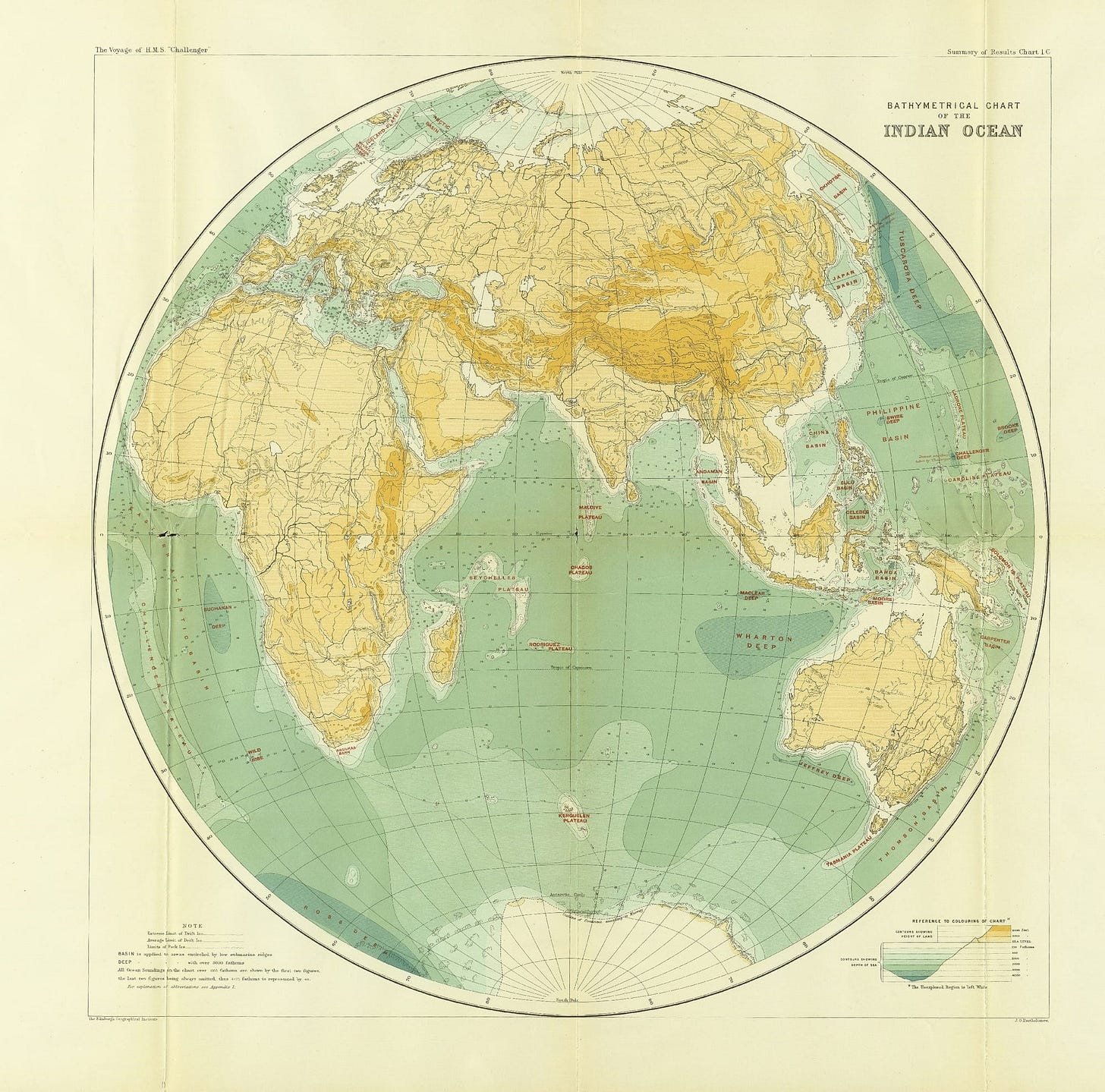
Rest of World
HEADLINES
Friday
Japan scrambled fighter jets after Russian planes circled the archipelago for the first time in five years. (Arab News)
Vietnam is considering resuming nuclear power development in order to ensure national energy security and economic growth. (Reuters)
Kim Jong Un, the leader of North Korea, visited a covert facility to produce weapons-grade uranium, and he made a rare public statement on Friday calling for greater efforts to "exponentially" expand the quantity of his nuclear weapons. (AP)
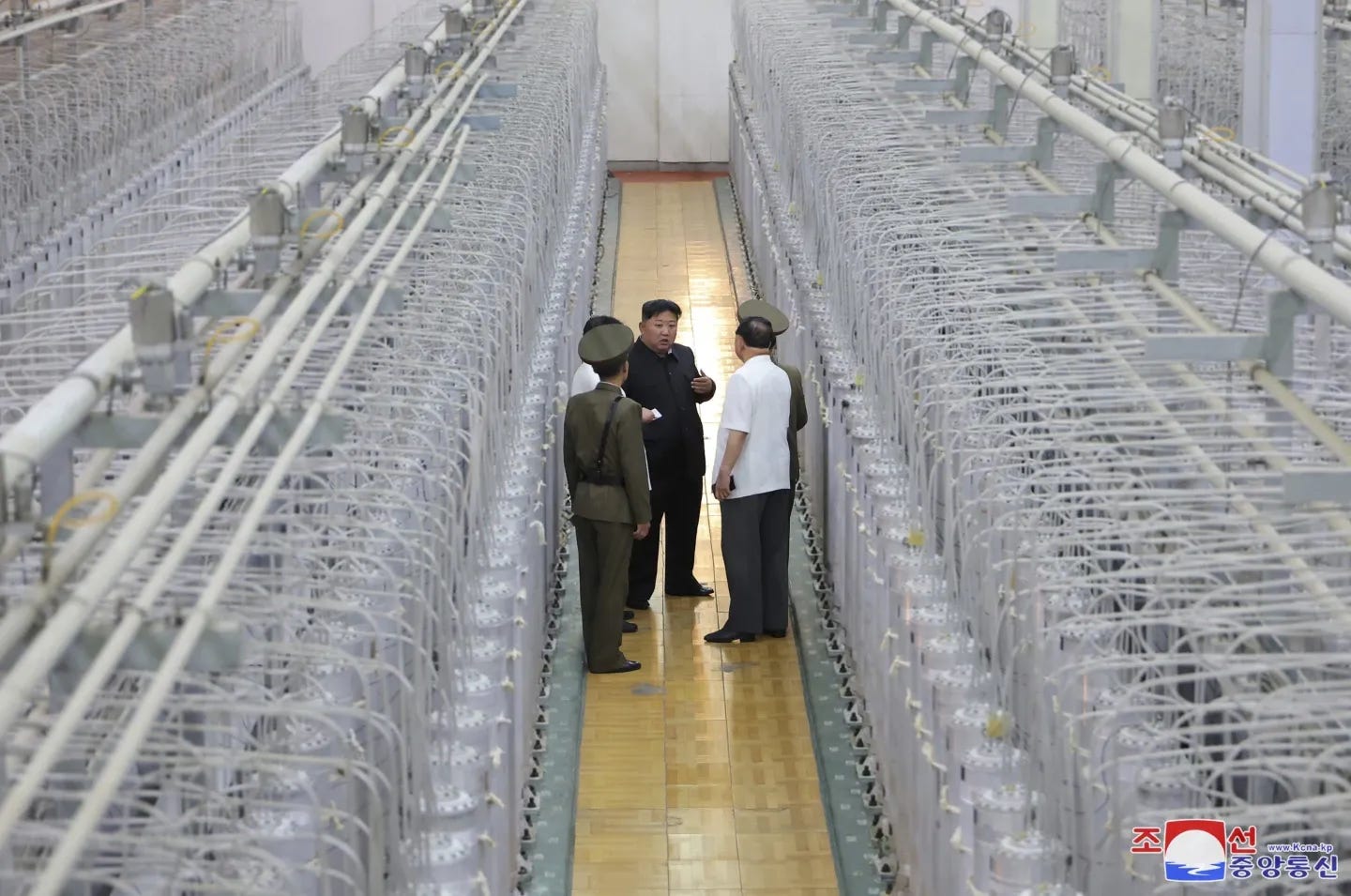
Russia has withdrawn the accreditation of six British diplomats, accusing them of spying, according to Interfax, citing the FSB national security service on Friday. (Reuters)
Thursday
North Korea fired multiple short-range ballistic missiles off its east coast on Thursday, South Korea's military said, the first such launch in more than two months. (NK News)
Japan's leadership race kicked off on Thursday (Sep 12) with a record nine candidates including the surfing son of a former prime minister and an arch-nationalist vying to be the first woman premier. (CNA)
The United States and Britain pledged nearly $1.5 billion in additional aid to Ukraine on Wednesday during a visit to Kyiv by their top diplomats as Ukrainian officials renewed their pleas to use Western-provided missiles against targets deeper inside Russia. (AP)
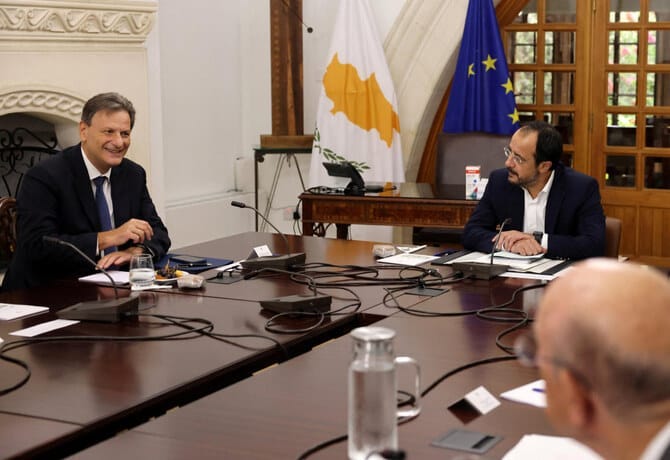
Türkiye said it condemned this week’s signing of a roadmap to boost two-way defence co-operation between the United States and the Republic of Cyprus. (Arab News)
Wednesday
French authorities foiled three plots to attack the Olympic and Paralympic Games in Paris and other cities that hosted the summer events, the national counterterrorism prosecutor said on Wednesday. (AP)
Iran's foreign minister said on Wednesday that Tehran had not delivered any ballistic missiles to Russia and sanctions imposed on Iran by the United States and three European powers would not solve any problems between them. (Middle East Monitor)
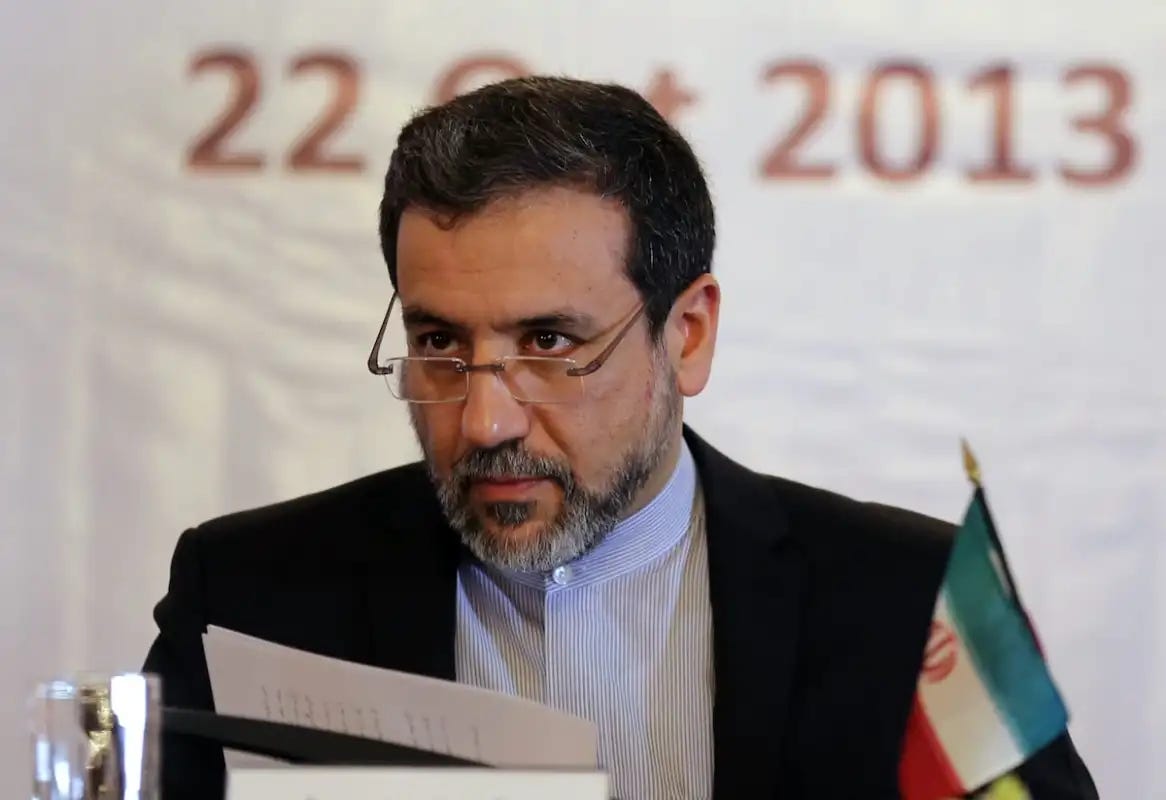
Bangladesh has ramped up vigilance at its border with Myanmar, with at least 18,000 Rohingya Muslims crossing over in recent months to escape escalating violence in Myanmar’s western Rakhine state, officials in Dhaka said. (Arab News)
Brazil's President Luiz Inacio Lula da Silva, after months of hedging on the issue, has committed his government to finishing a road through a pristine part of the Amazon rainforest, a move scientists say will bring disastrous deforestation. (Reuters)
Tuesday
The number of people killed by Typhoon Yagi and the rain that followed, which caused landslides and floods, increased to 87 reportedly. Seventy more people are still unaccounted for, and hundreds more were hurt. (PBS)
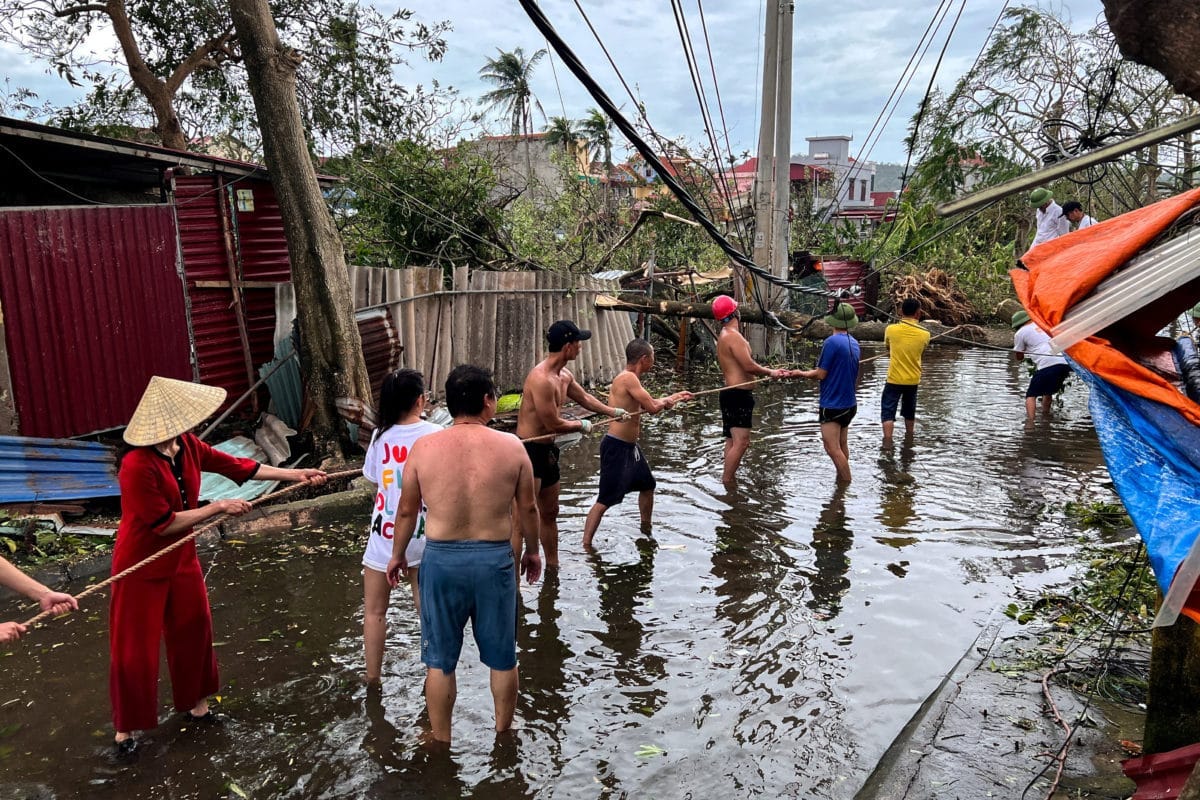
North Korean leader Kim Jong Un reportedly said that the nation is currently putting its nuclear force construction policy into action in order to "exponentially" increase the number of nuclear weapons. (CNA)
A "strong response" from the European Union will be given to the transfer of Iranian ballistic missiles to Russia, as stated by EU foreign affairs spokesperson Peter Stano on Tuesday. This move represents a further military escalation. (Reuters)
Pakistani police detained numerous MPs and leaders of former Prime Minister Imran Khan's party in searches on Tuesday, a day after the party held a large rally in the capital demanding his release, according to the party and police. (Arab News)
Monday
The Venezuelan opposition leader and former presidential candidate, Edmundo González, has gone into exile in Spain, dealing a bitter blow to opponents of the country’s authoritarian president, Nicolás Maduro. (The Guardian)
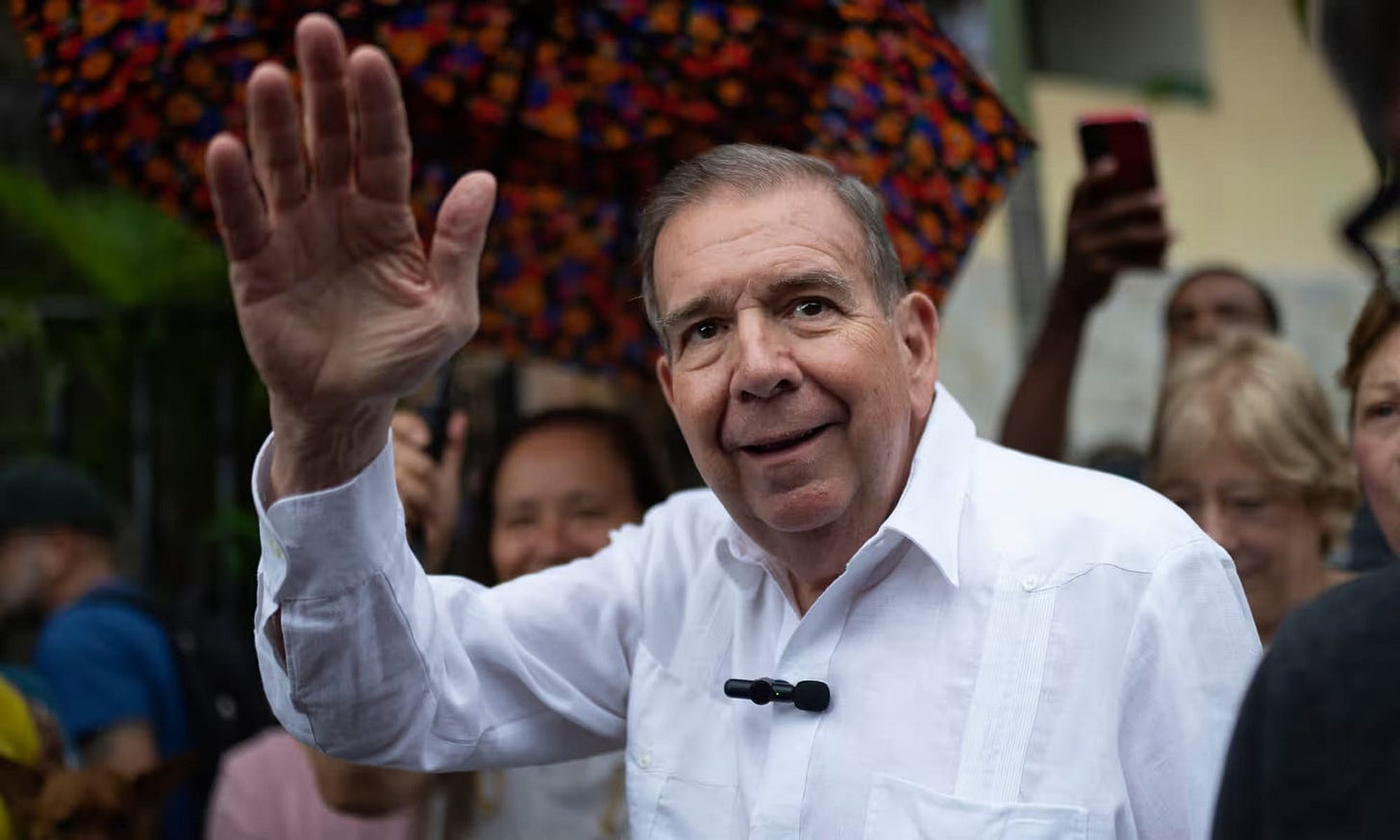
Algeria's incumbent President Abdelmadjid Tebboune was re-elected with about 95% of the vote, the country's electoral authority ANIE announced Sunday. (France 24)
Kuwait's Emir Sheikh Meshal al-Ahmad al-Sabah issued a decree on Sunday recognising Emad al-Atiqi's resignation as Deputy Prime Minister and Minister of Oil. (Reuters)
Turkish President Recep Tayyip Erdogan has called on the Organization of Islamic Cooperation (OIC) to organise an emergency conference to discuss Israel's conflict in Gaza. (Middle East Eye)
- - -


